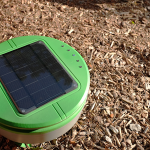 Despite farming being an industry that does not always strike one as being particularly high-tech, it is nonetheless at the forefront of the use of robots and automation at work. For instance, I wrote last year about a project called VitaPanther, which aims to provide a number of benefits to farmers, including speed of picking and a 24/7 operation.
Despite farming being an industry that does not always strike one as being particularly high-tech, it is nonetheless at the forefront of the use of robots and automation at work. For instance, I wrote last year about a project called VitaPanther, which aims to provide a number of benefits to farmers, including speed of picking and a 24/7 operation.
“Farming is the last profession in which the necessary profits can only be made with a large workforce. Automation is essential for us farmers, because the minimum wage is making vegetable harvesting unfeasible. Harvesting is sustained by two components: the availability of a seasonal workforce and the pay. A shift in one of these components jeopardizes the structure. The demand for technology is thus very great,” they say.
Or you’ve got the team from the University of Missouri, who developed a robotic system that they believe will transform the way scientists study crops.
Their robotic vehicle was equipped with a mobile sensing tower as well as three levels of sensors. This allows the device to inspect an area with a 60-foot radius to identify areas of environmental stress. It is also capable of capturing data from individual plants, and can then reproduce those plants via a 3D image.
Automated weed control
A particularly interesting area of exploration is in automated weed control. An early entrant to the market was the Bonirob robot that has been developed by Deepfield Robotics, a subsidiary of Bosch. They have developed a robot that can perform the more tedious aspects of modern farming.
It can successfully remove weeds from fields, manage plant breeding and various other crucial yet laborious tasks.
The ultimate aim is for Bonirob to act as a mobile plant laboratory that can decide upon the survival chances of plants on the fly or determine how much fertilizer is needed at particular times.
A more recent entry recently took to Kickstarter to raise money to bring their Tertill robot to market. The device is powered by solar energy and is free from any chemicals. The energy allows is to hunt down weeds, which are determined by measuring the height of what it encounters. If it’s over an inch, the plant is left alone, but if it’s lower it’s trimmed using a cutting wire.
The wheels also play their part, with the wheels used to trample weeds as they sprout. The device also comes with plant collars that can be placed around small plants to protect them from Tertill.
The device can be connected to a smartphone via Bluetooth, with an app providing the user with information and statistics on the machines performance. It’s estimated that the device will retail for around $250, with shipping due in May 2018.